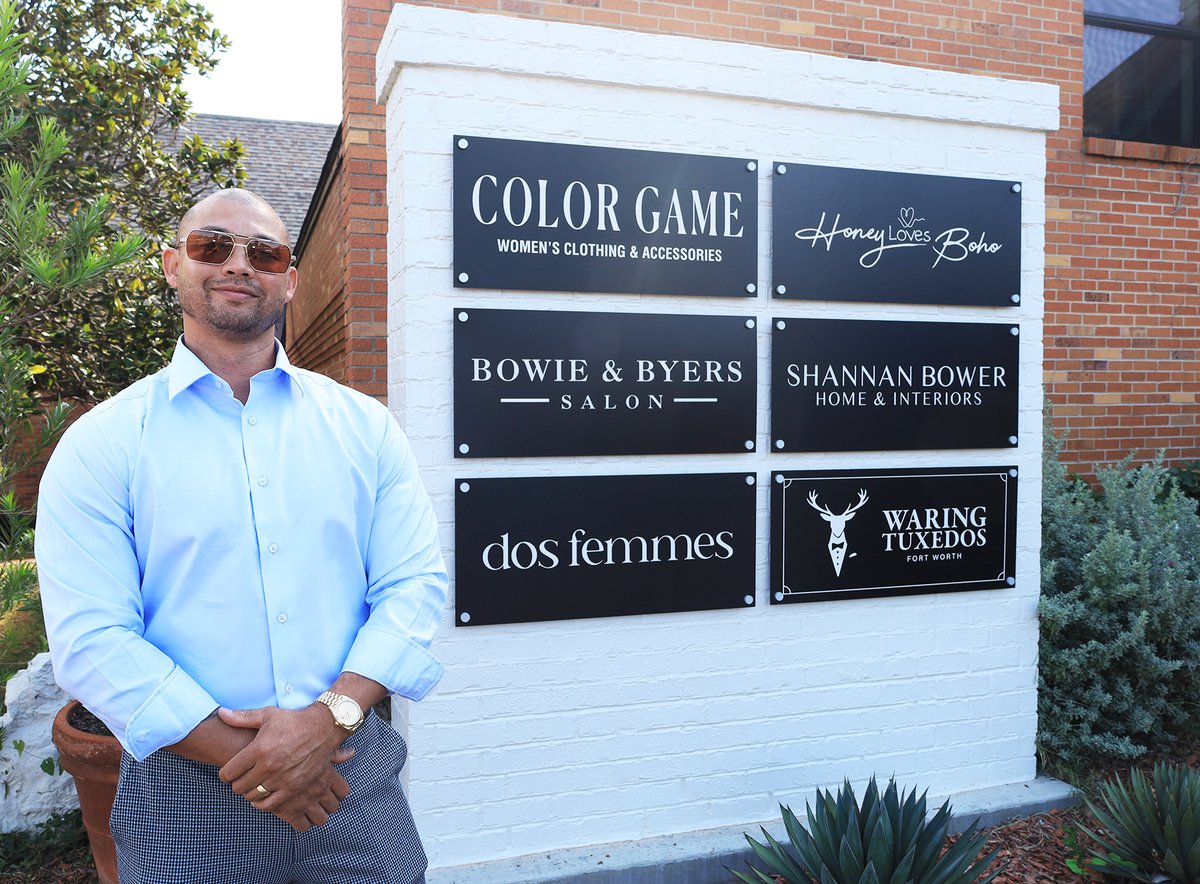Nearly two years ago, the 7,500-square-foot shell of what was once the Original Mexican Eats Café sat silent on Camp Bowie Blvd., a remnant of Fort Worth’s culinary past, scattered with broken walls, dust, and construction equipment. For decades, the Original had been more than a restaurant; it was a community anchor, a living memory of the city’s history, where locals and even a president once dined. Yet in 2023, after a 13-year legal entanglement over a disputed lease, the iconic Tex-Mex joint closed its doors.
Enter Derek Muzquiz, grandson of the family that owned the property. Taking the reins nearly two years ago, Muzquiz envisioned something different: a vibrant retail hub that preserved the building’s spirit while giving it new life.
“From where we started to the finishing touches, it’s just a complete transformation,” Muzquiz says, reflecting on months spent almost living onsite, logging 15- to 18-hour days as his own general contractor. He oversaw everything from HVAC and plumbing to drywall and flooring, working alongside a small team while breathing new energy into the historic space. His efforts did not go unnoticed — Muzquiz received the 2025 Camp Bowie District Transformational Award for his work turning the former restaurant into a vibrant retail hub.
Now, that vision is fully realized. The space has been divided into six retail spots that honor both Fort Worth tradition and contemporary taste — Waring Tuxedos Fort Worth, Shannon Bower Home & Interiors, Color Game Women’s Clothing & Accessories, Honey Loves Boho, Bowie & Byers Salon, and Dos Femmes.
“It’s remarkable,” Muzquiz says. “People tell me it’s such a great transformation. They wanted more shops on Camp Bowie — somewhere to grab coffee, shop a little, maybe get lunch.”
The renovation wasn’t without its challenges. The floor joists needed replacing, walls were demolished and rebuilt, and the vent hoods were so massive it took a large crane to remove them from the rooftop. Yet Muzquiz didn’t dwell on nostalgia. When asked if he kept any mementos of what was here before, he said, “Clean slate altogether. Got pictures if I want to remind myself of what it looked like.” Even so, some original elements survived: ceiling tiles, skylights, and the building’s signature crown molding preserve a touch of the past amid the modern retail spaces.
For tenants, the transformation has been a boon. Houston Waring of Waring Tuxedos Fort Worth relocated from Dallas after recognizing a gap in the western half of the metroplex.
“I knew Camp Bowie and Hulen was the space,” Waring says. “The building itself is beautiful — the tin tiles, the original floors, the history. It’s a unique space in a historic area.”
Shannon Bower, owner of Shannon Bower Home & Interiors, agrees: “This spot has been a whirlwind — the first brick-and-mortar retail space for me. People like to explore, to uncover different things. It’s been an adventure, a learning curve, but it’s been amazing.”
The transformation has also drawn new voices to the corridor. Kristen Barbee, a lifelong lover of Western and bohemian styles, launched her online boutique, Honey Loves Boho, in 2021 after years working in marketing for her family’s cattle and horse ranch. In May 2025, she opened her first brick-and-mortar location here.
“Retail has its ups and downs, but I feel like this location is the only reason I still have a brick-and-mortar,” Barbee says. “This location is a prime location. It brings so many people in, and in this day and age, that’s the number one thing that’s kept me here.”
Barbee notes the buzz around the neighborhood, with fellow business owners and locals excited about Camp Bowie’s revival.
“Everyone’s really excited that Camp Bowie is coming back to life. They’re even talking about bringing back the artsfest, or shutting down streets for a big movement to bring Camp Bowie back up because, for a while, stores were dead. But there are more boutiques, more small businesses opening, and it’s exciting,” she says.
Reflecting on the project and the building’s new life, Muzquiz closes with a perspective:
“We couldn’t make it a restaurant anymore. The restaurant business just wasn’t going to be there. But breaking the space into smaller suites? That’s better for the community, better for the tenants, better for the neighborhood.”
